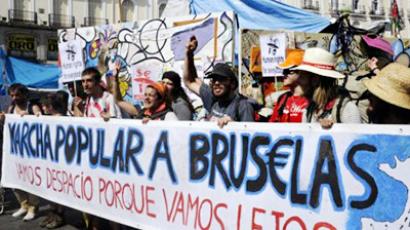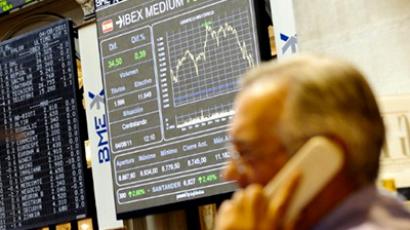Stock markets becoming bloodbath
Last week was the worst for world’s markets in three years and yesterday became known as Black Monday as shares plummeted, but today has been even worse and even the cheerleaders for the euro are now depressed.
The president of European Central Bank, Jean-Claude Trichet, says this is the worst crisis since World War II and requires “unconventional measures.”When you have a banker of his level, famous for his conservatism and calm, coming out with a statement like that, you understand why there is panic throughout Europe. The EU Central Bank’s head hoped that the European Central Bank’s (ECB) buy-up of Italian and Spanish debt, which no one wants to touch at the moment, would help the situation, but as we can see on the markets, it is not helping.This is all bad news for the euro, which has been slumping for the last three years. But the situation for the single currency today is getting even worse, because what the ECB is forcing is making the economies slower and less strong by forcing the countries to slash spending, which leads to creating fewer jobs, stopping investing into economy, infrastructure, in construction and road building.
The number one task for all countries now is to get their economies out into the open and get them growing again, to stimulate people and get them back to constructive work.These austerity measures are doing the opposite of what should be happening to the euro and this is compounding the problems.American President Barack Obama has consulted with the heads of Italy and Spain – the latest bail-out candidates – Italian PM Silvio Berlusconi and Spanish PM José Luis Rodríguez Zapatero.Economists say the US shares a common problem with the EU – unsustainable debt with no feasible resuscitation plans.
However, Gustav Horn, director of Germany's Institute for Macroeconomics and Economic Research, remains optimistic about the Eurozone’s economic prospects.“If we succeed in stabilizing the markets during the next days, we can be hopeful that the European economy will have just a minor dip during the summer and will return to an economic upswing after,” he told RT.Horn argues that the decision by the European Central Bank to buy Spanish and Italian government bonds is a very helpful measure in terms of restoring confidence following the downgrade of the US economy. “It already shows signs of working,” Horn claims. “In the longer run I am quite optimistic that the Eurozone will have a better institution than previously and we will have more stable development than during the past years.”
Dr. Christian Rieck, from Frankfurt Technical University, says the European Central Bank's move is actually doing more harm than good.“What the ECB is doing here is a breach of trust,” he argues, claiming that it encourages some countries to have a “free ride” at the expense of others. “In the long run it rather threatens the euro area than strengthens it.” According to Rieck, a direction which encourages more and more selfish behavior by individual countries could pose a real threat for the whole Eurozone.













